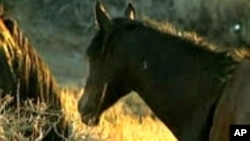<!-- IMAGE -->
Millions of wild horses, known as mustangs, once roamed North America. Today, just a fraction of that number are left, most in the American Southwest. In her new book Mustang, Deanne Stillman celebrates wild horses and warns that they are threatened by human activity.
The wild horse, or mustang, from the Spanish word for stray animal, is a symbol of freedom for many Americans.
The mustang has become an icon. The name and imagery were even used to market a classic American car.
In the 1800s, millions were rounded up and shipped to the western U.S. states.
Deanne Stillman has chronicled their story in her book Mustang.
"They were shipped back to Europe in tin cans," she noted. "There is a demand there for horse meat, and also at the beginning of the 20th century, there were a number of wars being fought all over the world, and the horses were shipped to the front lines in all of those wars, including our own, [during] World War I."
Today, there are just 36,000 wild horses and burros on U.S. government lands. Others have been rounded up in response to complaints from ranchers, angry that the animals graze on their land.
There also have been random shootings, illegal acts that spurred Stillman to get involved in the issue.
The horse came from North America, where it thrived in the last Ice Age. Stillman notes that ancient horse remains have been found at the La Brea tar pits in Los Angeles.
<!-- IMAGE -->
"During that period, those horses were living right here at the famous tar pits, along with the mastodon and sloth and many other mammals of that period," she added.
Horses died out in the Americas, but were reintroduced by the 16th century Spanish, and became part of the Western lore of the American cowboy.
"Those horses opened up the New World, really," she explained. "Without them and without the horse, we have no America."
In 1971, U.S. President Richard Nixon signed a law protecting wild horses and burros, but the animals' advocates, including Deanne Stillman, say they still are under threat, and that the animal needs protection.
In July, the U.S. House of Representatives passed a bill to restore protections for the wild mustang. The measure is called the ROAM Act, which stands for Restoring Our American Mustangs. A companion bill has been introduced in the Senate. If it passes, the two bills need to be reconciled before being sent to the president to sign into law.
U.S. Interior Secretary Ken Salazar has urged Congress to create new preserves for the wild horses.




